#TO SEE IT IN THEATRES AGAIN
Note
just saw asteroid city last night, pls explain the proposed significance of the kiss!!
answering this publicly hope thats ok! cant do a readmore im on mobile *****asteroid city spoilers below beware*****
i dont remember anyones names so this is gonna sound partly unhinged. okay so the edward norton playwright and jason schwartzman actor (not character, in the black and white parts) are lovers right. tbh i thought this was kind of a gag and forgot about it. but later we find out that the playwright died 6 months into the production. i didnt make the connection that THAT’s why the actor-jason has to suddenly leave the stage and freaks out backstage about how he’s not sure he’s Doing it right. hes not talking about acting!! because he himself is literally grieving his lover while he’s playing a character who’s grieving his wife written by his lover so obviously it’s too much!!! actor-jason is trying to find meaning in his death through his writing but there isnt any meaning in death [gerris drinkwater voice] which is what the play is trying to say anyway. he doesnt think he’s performing grief right even in his own life!!! (and tbh it’s the 50s so he wouldnt be able to perform grief publicly anyway!!!!) the play starts with a car accident… anyone would search for some hidden meaning there, some sign…. so when he talks to margot robbie outside it’s not really about finding the CHARACTER’s motivations it’s about the actor himself being able to process the playwright’s death! and adrien brody director was probably also dealing with that too (him and norton seemed to be good buddies) so the whole “sleeping backstage” thing gets a bit sadder maybe? maybe everyone else got this in the theatre and im just stupid lol but crazy making stuff to me!!! the whole story is about sublimated gay grief that cannot be expressed?!?!
the tweet that caught me onto this was here which posits that the playwright’s death was a suicide but i think that’s pretty stupid and unnecessary because the whole thing about the play asteroid city is that death is random and meaningless. im pretty sure that’s what the alien represents— a shocking and absurd event that isnt outright evil or menacing, not something anyone can predict or make sense of, it’s just a thing that happens to you out of nowhere, it doesnt mean anything. he’s a little black figure, he’s death! giving and taking! aagh
#you’re the wife who played my actor :(#posthumus#asteroid city#imagine youre in love with a playwright and he writes a play before he even meets you about how you cant get over his death which hasnt#happened yet. id go insane too#im going to see it again to see how this informs the whole thing because its driving me crazy#rewatching the performances knowing that they're performing people performing. augh.#remember when bryan cranston accidentally appears in frame. rending my garments#also ‘you cant wake up until you fall asleep’ confused me a bit but then i remembered that the margot robbie scene was supposed to be put o#as a dream sequence and it makes sense now. thanks#aliens are the new fairytale monster symbol of death. the ultimate Unknowable#EDIT okay i read the wikipedia summary got some facts wrong adrien brody is sleeping in the theatre during rehearsals so its not because of#the playwright’s death he’s just like that.
2K notes
·
View notes
Text
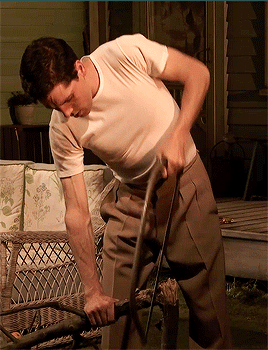
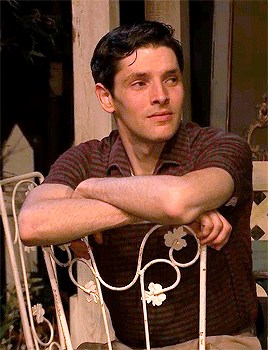
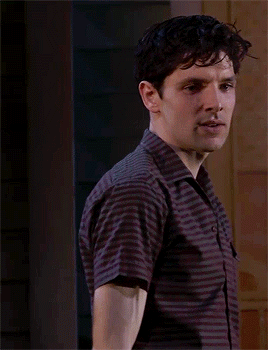
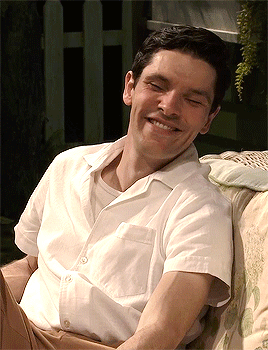
Colin Morgan in All My Sons (2019)
#colin morgan#colinmorganedit#merlincastedit#all my sons#theatredit#merlin cast#i finally got round to watching this - i really enjoyed it! i wish i'd gone to see it#i need him to do theatre again#it's worth a watch - you can get a month basically free on the national theatre at home#my gifs#colin1
422 notes
·
View notes
Text
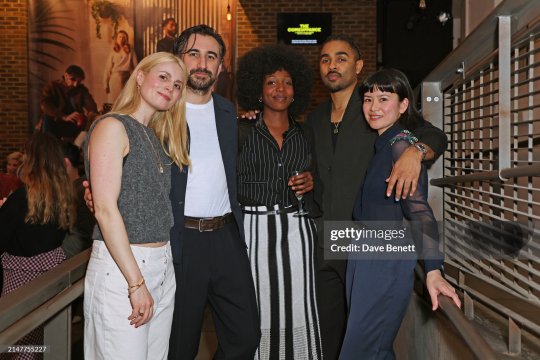
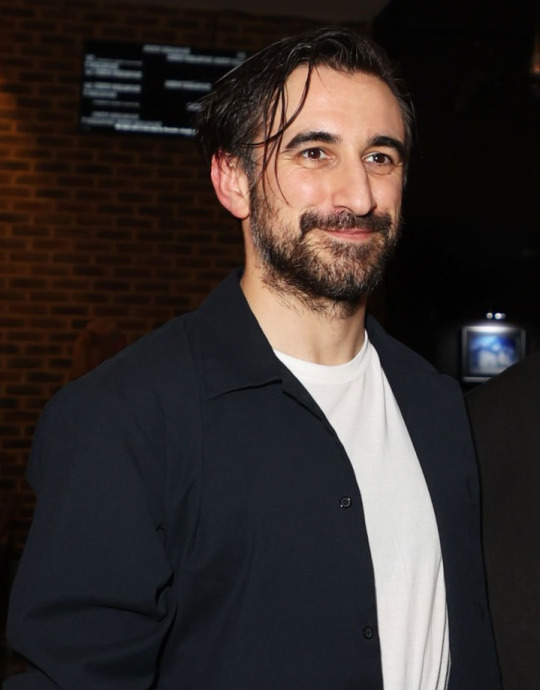
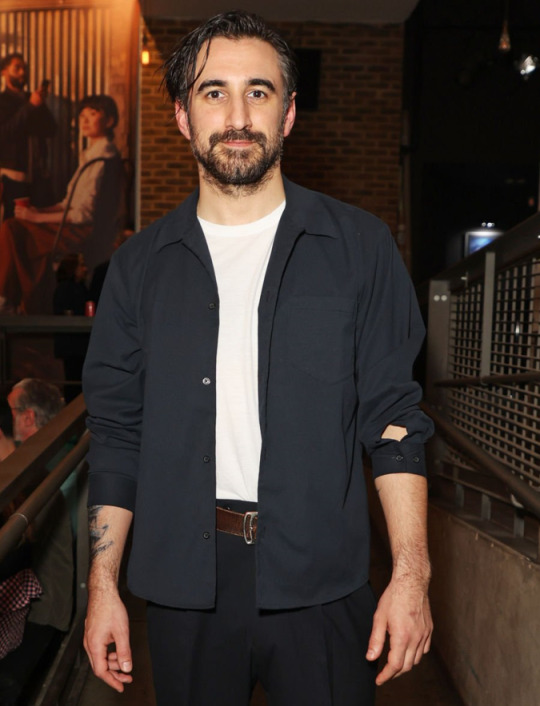

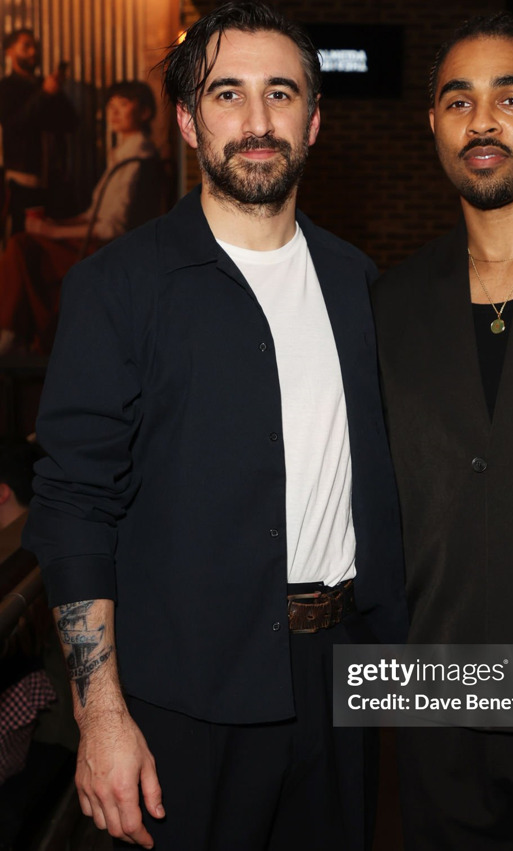
More for the soul! :D Also including the fake tattoo for his character!
[Comeuppance Press Night After Party]
#almeida theatre#the comeuppance#ferdinand kingsley#once again. i would like to see it#pls. a stream#and then i could gif it also#which would make me very happy#also i feel like my last anon was telling me smth
131 notes
·
View notes
Text
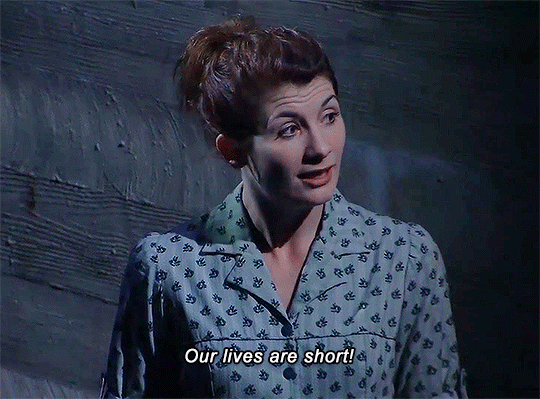
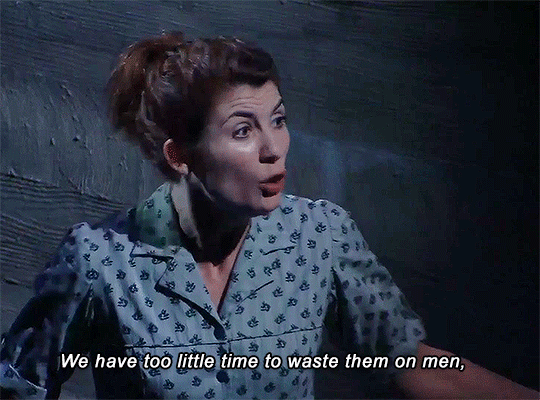
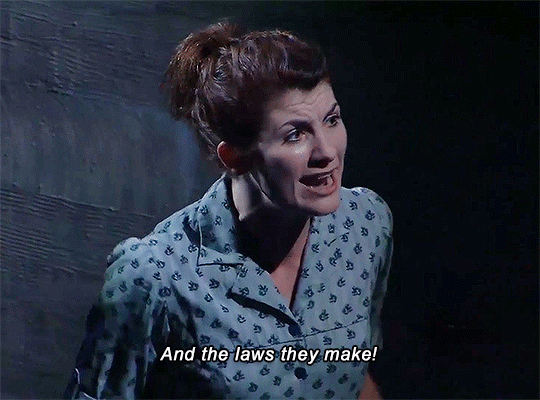
Do as you please, Live, by all means!
The laws you will break are not of man's making
#antigone#antigone 2012#jodie whittaker#theatreedit#national theatre#national theatre live#nt live#greek drama#sophocles#antigone posting#if youre seeing this again its cuz my old acc got obliterated saur
152 notes
·
View notes
Text
I need to watch Sharpay's Fabulous Adventure to reach my final conclusion on if she's even attracted to men
#girl help i keep thinking about sharpay and ryan being each others only friend growing up#theyre not very good at interpersonal relationships#romance is foreign to them. they dont care about playing romantic interests because they only view romance through the lens of theatre#fake. not real. an act to entertain an audience. so they dont understand why it would be weird#neither of them have ever kissed anyone#sharpay likes things that make her look better#because her whole life is a performance#so she wants troy because hes a shiny accessory to her#thinking about hsm 2 where once again when she tries to perform a romantic song (with troy this time and not her brother)#she still barely fucking looks at him#all of her attention is on the (nonexistent) audience#and ryan. ryan hm#ryan usually performs alongside sharpay#its usually an in universe performance. theyre on a stage. theres an audience#and all of his attention is on pleasing that audience#an exception to this is during the gay baseball song#where theres a different kind of audience BUT#ryan barely looks at them#most of his attention is directed solely to chad#talking flirting teasing being cocky and annoying but clearly addressing him directly through most of the song#first time this has happened with ryan. take that as you will#ANYWAY i can see sharpay as completely uninterested in romance but she hasnt realized that about herself#and she THINKS she wants it. because she sees it as glamorous#or maybe shes a lesbian i dont know#she might be a lesbian#the deciding factor is sharpays fabulous adventure#if she has chemistry with the guy in that movie then shes just repressed and clueless#if she doesnt shes aro#or possibly lesbian
99 notes
·
View notes
Text
do you ever just cry while thinking about how tender creature is with lisa or are you normal?
#something about that peach ring proposal scene just gets me and the way he just looks at her with so much love#granted it could be because i’m really depressed rn but damn does that scene in particular get me#i’m so mad the site i usually use isn’t working for me for some reason rn#and i could go to my local theatre since they’re still showing it but god i’d have to get out#but also god i REALLY need to watch this film rn bdcause it unfortunately is my current comfort film/hyperfixation#and i can’t justify paying the digital price for it while i already preordered the physical copy#save me lisa frankenstein save me#somehow gotta make it to fucking sunday when i’m going to see it again#until then i’m just gonna stare at gifs and cry about how sweet they are#lisa frankenstein#meaghan rambles
81 notes
·
View notes
Text
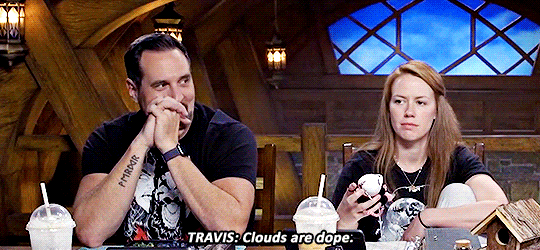

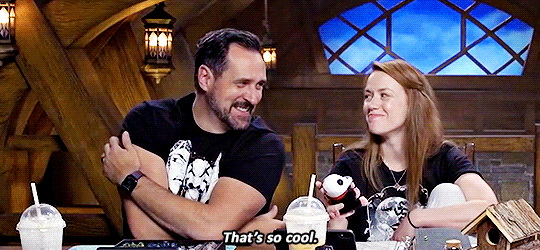

C3E40: reacting to the cloud projections
bonus travis first noticing them:

#critical role#criticalroleedit#travis willingham#ashley johnson#marisha ray#gifs#*#*cr#cr3#marisha & travis#producer ray#theatre#scheduled#50m c3e40#GOD i wish the clouds showed up better on gifs. go back and watch this in the twitch vod it's Amazing#and to be clear they aren't referring to the clouds in the window!!#if you watch the background in the first two gifs you should be able to see them#ugh. i've said it before and i'll say it again#as a lighting designer this set TURNS ME ON. THANK YOU MARISHA RAY#i love seeing travis' childlike wonder and marisha's pride it's everything to me.
417 notes
·
View notes
Text
"Minkowski's been talking about Sondheim again…": Minkowski's love of musical theatre and what it reveals about her characterisation and her relationships
TL;DR: Renée Minkowski's love of musicals, while it might seem just like a mundane character detail, is used to give depth to her character because it contrasts with expectations of her from both the listening audience and the other characters. Her willingness or unwillingness to share this interest in different circumstances reveals her relationships with other characters at various points.
Since this is a long one, if you'd rather read it as a document, you can view it here: Google Doc version.
"She actually really cares about these talent shows": Episode 8 (Box 953)
In the early episodes of Season 1, Minkowski is presented (largely through Eiffel's unreliable perspective) purely as a strict no-nonsense authority figure without much emotional depth, the kind of person who only likes things that are useful, purposeful, or mandated by Command. In contrast, musical theatre is a creative pursuit that has nothing to do with the mission of the Hephaestus and is viewed by many people as fairly frivolous or silly. The gradual exploration of Minkowski's passion for musicals is one of the many ways that the show expands and challenges our understanding of her as a character.
The first indication that we get of her interest in musicals is through her entry into the infamous talent show, something that is required as part of the mission. Minkowski really cares about 'crew morale' activities in general, even when they actually have a negative effect on morale and even before she's friends with any of her crew (for example, the Christmas and Thanksgiving dinners in the earlier stage of the mission), perhaps partly because doing things in the "right way" is important to her.
But Eiffel senses that the talent shows aren't just about rules for her: "it’s bad enough when she makes us do something just because it’s military protocol, but I think that she actually really cares about these talent shows". This might be the first indication that we get of Minkowski caring deeply about anything that isn't inherently part of her role as a Commander. Moments like this are part of the gradual process of giving us insight into her character beyond the Commander archetype that she tries to embody. And yet, she only indulges her theatrical passion because something mandatory gives her permission, or an excuse, to let another part of herself out.
Of course, to satisfy the needs of a talent show, she'd only need to provide a performance of a few minutes. But Eiffel mentions "the second act of the play" - which along with Hera's comment that "Isabel isn't the biggest role in the play" - implies that Minkowski was intending to put on the whole of Pirates of Penzance as her talent show act, rather than a few of the songs or some kind of medley. (I suppose that Eiffel could be exaggerating or Minkowski might have been planning to do extracts from different parts of the play, but I prefer the interpretation in which Minkowski gets to be more ridiculous.)
Even though no one else would be willing to be in her production of Pirates of Penzance, Minkowski casts Hera as Isabel, a role with two lines and no solo singing. I found some audition notes for this play which said "The traditional staging gives [Isabel] more prominence than the solo opportunities of the part suggest, so she must be a good actress" which does make me sad in relation to Hera's inability to have a more significant role by being physically present on stage.
It’s sweet that Hera still wants to take part though. She tells Eiffel "Pirates of Penzance is a classic of 19th century comic opera", so either she’s absorbed what Minkowski has told her about the show, or she’s done her own research and formed her own opinions. I enjoy the fact that Hera is the one Hephaestus crew member who shows potential to share Minkowski's musical theatre appreciation; I like to think that this is something they could explore together post-canon.
Anyway, I'm obsessed with the idea that Minkowski was planning to play every character except one in Pirates of Penzance, a show which is designed to have 10 principal characters and a chorus of 14 men. It seems that her contribution to the talent show was supposed to be an entire two-hour two-act musical, with costumes and props, in which she would play almost all of the parts. This is very funny to me as the perhaps predictable consequence of giving an ambitious and frustrated grown-up theatre kid a position of authority and asking them to arrange a talent show. Minkowski knows that the audience will be made up of her subordinates who are theoretically obliged by the chain of command to watch and listen, so she absolutely tries to make the most of that opportunity. There's probably also a degree to which she limits other people's involvement in her musical because - as with her other endeavors - she wants the outcome to be almost entirely within her control (something that is usually pretty much impossible in as collaborative a medium as musical theatre).
Of course, Minkowski's behaviour in most of the talent show episode is affected by her being drugged by Hilbert. This creates an exaggerated situation which is the first real opportunity for Minkowski to be something other than the strict sensible authoritarian Commander and the foil to Eiffel's jokey laid-back attitude. I don't agree with ideas that being intoxicated brings out anyone's true self (especially in the absence of consent for the intoxication), but it seems pretty clear that being under the influence of whatever was in Hilbert's concoction caused Minkowski to fully commit to a level of manic enthusiasm for her musical production that might have otherwise been obscured by her professionalism. It's a particular kind of person who belts showtunes when drunk, and Minkowski is that kind of person, even if that's not how she wants to present herself. (As a sidenote, I seem to remember that they took Emma Sherr-Ziarko's script off her to help her sound more drunk. It's an excellent performance.)
Minkowski wants interval ice cream. She wants "pirate costumes" (and she'll threaten to shoot a man to get them). She wants "swashes and buckles". She wants whatever props she can get her hands on (including a real cannon). This show is important to her, even though only three other people will witness it and two of them actively don't want to be there. It’s important to her for its own sake.
Eiffel says Minkowski wants "a second pair of eyes to tell her if the prop sabre for her Major-General costume was a bit much…" While I certainly wouldn't put it past Goddard Futuristics to have a prop sabre on the station for no apparent reason, it feels more likely that she might have made it or adapted some existing item. Which suggests that maybe she was that passionate about the props even before Hilbert drugged her.
Even so, it does feel significant that Minkowski's love of musicals is only revealed in the episode in which she is drugged, exhibiting lowered inhibitions, exaggerated behaviour, and an "impaired euphoric effect". Her love of musical theatre is initially revealed through a professional structure that provides permission, and then further emphasised by a forced intoxication that exaggerates some impulses that perhaps she already had.
"Some hobbies other than making trains run on time": Episode 17 (Bach to the Future)
After Eiffel tells to find Minkowski to find something else to do while her work duties have quietened down, they have the following exchange:
EIFFEL: You must have some hobbies other than making trains run on time. Something to do with friends? Boyfriends?
MINKOWSKI: Of course I do, but, well, there aren't really a lot of opportunities for rock climbing or trail hiking in the immediate vicinity.
Even though this quote doesn't mention musicals, I've included it here for two reasons. Firstly, it's very funny to me that, even after the talent show debacle, Eiffel acts like he's never had any evidence of Minkowski's hobbies. She tried to perform a whole play almost single-handedly and it didn't occur to him that this might indicate an interest of hers outside of work. I think this reflects the fairly two-dimensional view that Eiffel has previously had of Minkowski, which her interest in musical theatre didn't fit into.
Secondly, it feels notable that Minkowski doesn't mention musical theatre here. She wants to show that she has non-work interests, but without undermining her own authoritative image. Her interest in rock climbing and trail hiking - while it may be genuine - fits with how she wants to be seen as a Commander. These are hobbies which portray her as physically capable, with a high degree of stamina and a willingness to adapt to perhaps less hospitable surroundings. Of course, Minkowski does have these traits and they serve her well on the Hephaestus. But there's not really anything particularly surprising about her expressing these interests. The surprise in this scene comes from the reveal that she has a husband, a character detail which - like her love of musicals - isn't something we'd necessarily expect from the archetype-based view of her we are initially presented with.
Her interest in rock climbing and trail hiking never come up again, because these details don't really deepen her characterisation (or at least, they aren't really used to deepen her characterisation beyond proving that she isn't entirely all-work-and-no-play). In contrast, Minkowski's love of musicals is brought up over and over because it shows another side of her that she struggles to reveal on the Hephaestus, and that allows more interesting things to be done with her characterisation.
"You wanted to write showtunes": Episode 35 (Need to Know)
Alongside the more high stakes discoveries prompted by the leak from Kepler's files, we also learn that Minkowski applied to - and was rejected from - the Tisch Graduate Musical Theater Writing Program.
Up until this point, we've only had evidence that Minkowski enjoys performing in musicals. But here we learn that Minkowski doesn't just love watching or performing in musicals - she wanted to write them too. This suggests a creative side to her that we never see her fully express.
The course
The Tisch Graduate Musical Theatre Writing Program claims to be the only course of its kind in the world and it accepts just 30 students each year. The current application process requires applicants to: upload play scripts or recordings of songs they've written; answer a large number of extended response questions about their creative process and views on musical theatre; write a 'statement of purpose' which has to talk about why they are applying and include 3 original ideas for musicals; provide a professional resume and a digital portfolio; complete an exercise of writing in response to a prompt; and undergo an interview. The process might have changed somewhat since Minkowski would have been applying (which, if it was soon after she finished college, might have been around the early 2000s) or it might be different in Wolf 359's alternate universe, but I think we can safely assume that applying to this course was a serious undertaking that required an intense amount of commitment and work.
Applying to a course like that isn't something you do half-heartedly or on a whim. You couldn't apply to this course if you hadn't done a fair amount of musical theatre writing already. (The course requires applicants to choose to apply as bookwriters, lyricists, or composers, but I'm not going to make a guess here as to which of these Minkowski went for.) The fact that Minkowski wanted to study this course suggests that she was seriously considering trying to make a career out of musical theatre writing. In Once In A Lifetime, she tells Cutter that commanding a space station has always been her dream job, but we've got evidence here that it wasn't her only dream job. There's something kind of funny and kind of sad about the idea that writing musicals was her back-up / fall-back career path. She does not like to make life easy for herself.
The revelation
This information is revealed against Minkowski's will. It's not something she wanted people to find out, and she isn't happy about them knowing:
JACOBI: "Dear Renée, thank you for your interest in the Tisch Graduate Musical Theater Writing Program..."
MINKOWSKI: Oh, come on!
JACOBI: (pressing on) "We are sorry to say, we will not be able to offer you a spot in this year's blah blah blah." Oh this is too good. You wanted to write showtunes?
MINKOWSKI: Number one? Shut up. Number two, why are my personal records on there?! [...] How is it in any way relevant?!
JACOBI: Oh, I think it's very relevant. I mean, if you're sending someone to pilot ships in deep space, you want to make sure that they can, you know... paint with all the colors of the wind.
Jacobi CRACKS UP - and, although to a lesser degree, so does Lovelace. Minkowski looks at her: really?
LOVELACE: Sorry, Minkowski. It's... it's a little funny.
MINKOWKSI: No, it isn't!
Minkowski seems defensive and embarrassed here. She obviously doesn't trust everyone there with this revelation (Jacobi, Maxwell, Lovelace, and Hera are all present). She considers this information to be "personal" and irrelevant and not even "a little funny". She's used to reactions like Jacobi's (and to a lesser extent Lovelace's); in Ep41 Memoria, she says "most people think it's hilarious that I like musicals" (see below for more thoughts about this quote). But the fact that these mocking reactions are expected doesn't mean that they don't bother her. She wants so badly to be taken seriously and, in this scene, her interest in musical theatre seems to be incompatible with that. Jacobi reacts the way that he does because of the idea that I've already expressed, that a passion for musical theatre does not fit with the serious authoritative image that Minkowski has often presented. It's not the typical hobby of a soldier, especially not a Commander.
To me, the way Lovelace laughs suggests that she might not have previously known about Minkowski's love of musicals, or at least perhaps not the full extent of it. At any rate, it's definitely news to Jacobi. And Minkowski clearly hasn't talked about it enough for it not to feel like a big reveal for her.
The rejection
It's notable that this reveal is not just that she wanted to write for the stage, but also that she failed to get into a course that might have helped her work towards that goal. This of course compounds Minkowski's discomfort at having this information revealed. Not only did she want to write showtunes, but she encountered rejection in her attempts to do so. This detail implies that perhaps it wasn't just the appeal of her spacefaring dream that stopped her going down a theatrical career path.
I'm about to move more into headcanon territory rather than just straightforward analysis, but I personally believe that, while Minkowski auditioned for a lot of musicals (particularly as a child / young person), she was never cast as the main role. She seems embarrassed about her interest in musical theatre in a way that (at least judging by people I've encountered) people who were always the lead in their school / college productions don't tend to be.
We don't have much evidence about her actual level of singing/acting ability, given that she is inebriated during the only time we hear her sing in the podcast. However, it resonates with other aspects of her characterisation to imagine that Minkowski was generally good enough to get an ensemble part but never quite good enough to be cast as a main part. I think she might see only ever being cast as part of the ensemble, and failing to get into the Tisch Musical Theatre Writing programme, as slightly more down-to-earth examples of the same pattern as her repeated rejections from NASA. She is desperate to prove herself. She is "someone who very much wants to matter. To do something important." When she casts herself as almost every part in Pirates of Penzance, she is finally taking the opportunity to be a main character, an opportunity which I imagine had been denied to her over and over in both a literal and metaphorical sense.
"It's just from a play I saw once": Episode 41 (Memoria)
The next scene I want to talk about is from a memory of Hera's, which took place on Day 57 of the Hephaestus mission and in which Minkowski appears to be talking about the Stephen Sondheim musical Sunday in the Park with George:
MINKOWSKI: Oh, it's just from a play I saw once. It doesn't matter. (BEAT) The guy who sings it is this famous French painter. And his entire life is kinda falling apart. But he can always turn what's happening around him into these beautiful paintings.
HERA: And?
MINKOWSKI: And... That's, I don't know. Reassuring, maybe? (BEAT) I don't know why I'm going on about this. You don't care.
HERA: I think it's interesting.
MINKOWSKI: Yeah? Most people think it's hilarious that I like musicals.
HERA: I don't see what's funny about it.
MINKOWSKI: Well, thank you Hera, but you're not exactly... you know.
HERA: I'm not... what?
There's a couple of different things I want to pick out from this exchange. Firstly, the line "Most people think it's hilarious that I like musicals" makes me sad. I don't think she's talking about people on the Hephaestus there. Judging by the quote I talked about from Bach to the Future, Eiffel definitely wouldn't have registered Minkowski's love of musicals at this stage, and I doubt Hilbert cares at all about the hobbies of his fellow crew members. So Minkowski is talking about experiences that she's had on Earth, of people mocking her interest in musicals and thinking it doesn't fit with who she is. You can hear the impact of those experiences in Minkowski's reluctance to elaborate, in the way she says that something she obviously cares about doesn't matter, in her assumption that Hera doesn't care.
Secondly, this scene is a complicated one for Minkowski and Hera's relationship. On the one hand, Minkowski freely talks to Hera about something she's passionate about, and Hera listens and expresses interest. Hera validates Minkowski's interest in musical theatre without making a thing of it being weird and Minkowski thanks her. Again, it’s shown as an interest they could could potentially share.
But on the other hand, it seems like part of the reason Minkowski feels able to open up to Hera is because at this point Minkowski doesn't see opening up to Hera as fully equivalent to opening up to a fellow human. She doesn't just accept Hera not making fun of her interest; instead it seems Minkowski is about to imply that this lack of judgment indicates Hera's difference from humans (although she does have the decency not to say it outright). Minkowski's expectation of judgment from others contributes to her saying something very hurtful to Hera here. (This kind of potential consequence of negative self-attitude is explored a lot with Eiffel, so it's interesting that Minkowski can sometimes have a similar issue.)
Minkowski and Hera's conversation is interrupted when:
The DOOR OPENS.
EIFFEL: Hey, Minkowski, we've - What are you guys talking about?
MINKOWSKI: We were just discussing how I'm going to take away your hot water privileges if you don't reset the long-range scan.
Eiffel can obviously tell that he's walked in on a conversation that is about something other than work, or he wouldn't have asked. But Minkowski actively chooses not to tell him that she was talking to Hera about musicals. Perhaps she doesn't know how to open up to a human subordinate about it. Perhaps she doesn't trust him not to make fun of her. Perhaps she just doesn't have any impulse to talk about her interests with him. Either way, if Minkowski's love of musicals is something which reflects a side of her personality outside of her Commander role, this is a moment where she chooses not to take an opportunity to share that side of herself with Eiffel. This reflects the emotional distance between them three months into the mission, which forms a nice contrast with the next couple of quotes I'm going to talk about.
"Composition. Balance. Harmony.": Episode 54 (The Watchtower)
When Eiffel comes directly face to face with alien life, he discovers that music is the human invention that fascinates the Dear Listeners:
EIFFEL: You haven't figured out music?
BOB: ORDER. DESIGN. TENSION. COMPOSITION. BALANCE. HARMONY.
EIFFEL: (low, to himself) Minkowski's been talking about Sondheim again…
I only learned in the course of writing this post that in this moment the Dear Listeners are almost exactly quoting a repeated phrase used throughout Sunday in the Park with George. The titular protagonist lists various combinations of these qualities in multiple songs in reference to his art. In the closing song, the lyrics are "Order. Design. Tension. Composition. Balance. Light. [...] Harmony." It's not only Eiffel's references that the Dear Listeners are incorporating into their speech - they've picked this one up from Minkowski. This also suggests that some element of her appreciation for musicals and the way she talks about them has fed into the Dear Listeners' understanding of the human phenomenon of music. The Dear Listeners aren't just parroting - they understood the quote enough that they left out the word "light", arguably the only quality in that phrase which isn't a big part of music as well as visual art. Eiffel likes music too, but I don't think that this is how he'd talk about his favourite songs.
This is a refrain about finding order and beauty out of the chaos and uncertainty of life, which was also the aspect of Sunday in the Park with George that Minkowski focused on when talking about it in Memoria. It suggests that art/music could be something governed by rules and principles, which is potentially something that appeals both to Minkowski and to the Dear Listeners.
Eiffel's response to this reference is one of those little hints that reminds us that Eiffel and Minkowski have spent a lot of time together and that not all of that time has involved them being at each others' throats or actively in a life-or-death situation. Some of it has just been Minkowski going on about a musical she loves and Eiffel (willingly or not) paying enough attention that he recognises this phrase as a Sondheim quote that Minkowski has talked about. I suppose that this quote might have been in Eiffel's pop-culture-brain anyway, but judging from Eiffel's general tastes and the fact that I don't think Sunday in the Park with George is one of the more commonly known Sondheim musicals among non-musical fans, it seems more likely that this quote is something he only knows because Minkowski has talked about it.
Eiffel sounds exasperated at the mention, like he's heard Minkowski talk about Sondheim far too much. But I'd argue that this still says something positive about their relationship, when we contrast it with a couple of other moments I've already mentioned. Firstly, when her previous musical theatre ambitions are revealed to Jacobi, Maxwell, and Lovelace in Need to Know, Minkowski seems embarrassed and defensive. Secondly, in the memory from Memoria, she avoids telling Eiffel that she was talking about this same musical. Yet, by the time The Watchtower takes place, Eiffel is sick of hearing Minkowski talk about Sondheim. She doesn't have the same barriers up in sharing her interests with him, even though he doesn't have the same interests. I think this is a demonstration of how comfortable she feels with him. It's a hint at the kind of easy downtime that they've sometimes shared.
"One day more": Episode 61 (Brave New World)
Eiffel recognises another musical reference of Minkowski’s in the finale. As the crew are preparing for their final confrontation with Cutter and co., Minkowski quotes Les Misérables, mostly to herself - but Eiffel recognises the lyrics and joins in:
EIFFEL: Hey - chin up, soldier. We're almost through. Just one more day, and then we're done.
MINKOWSKI: Yeah, one more day. (more to herself) The time is now, the place is here - one day more.
EIFFEL: - one day more.
They both stop, dead in their tracks.
MINKOWSKI: Did you just - ?
EIFFEL: Was that what I - ?
They look at each other: No way. And BURST INTO LAUGHTER.
EIFFEL: Man... this is really it, huh? The end of everything.
It feels really important that Minkowski and Eiffel share this moment of togetherness before she tries to send him back to Earth and before the rest of the action goes down. I think there’s some nice symbolism about them finding a way to communicate that they both understand. Making references is Eiffel's thing, and musicals are Minkowski's thing, so this is a synthesis of their two approaches. Again, there's a contrast with Minkowski's previous unwillingness to share her musical theatre passions with Eiffel (at least without the mitigating circumstances of a mandatory talent show and some kind of intoxicating substance).
I talked about the significance of the fact that they reference this particular musical in this post from ages ago. I don't think it's too much of a spoiler for Les Misérables to say that the revolution that the song One Day More is building up to does not end well for the revolutionaries. When Eiffel says "Just one more day, and then we're done", it encompasses both the possibility that the crew will escape to travel back to Earth and the possibility that they will all die. Minkowski's reference to a famously tragic musical suggests that it's the latter possibility that's at the forefront of her mind (right before she tries to send Eiffel away from the danger). But Les Misérables is also a story about people standing together in solidarity against powerful oppressive forces, which gives particular resonance to the way that this reference brings Eiffel and Minkowski together in a moment of being completely on the same wavelength as they prepare to fight Cutter and Pryce's plan.
When they laugh here, it's not about the 'hilariousness' of Minkowski's interest in musicals, it's about their unexpected unison - Eiffel's recognition of Minkowski's reference and Minkowski's surprise at the fact he joined in. It's a laugh of togetherness, of shared understanding, of friendship. It's a moment of lightness in dark times. And that moment is provided by Minkowski's pop culture interests, not Eiffel's. In spite of all they've been through, she's not lost that part of herself, and in fact, she's more open about it, at least to Eiffel.
I'll finish by highlighting what Eiffel says when he's trying to get into character to impersonate Minkowski so he can turn the Sol around:
EIFFEL: Umm... yes, this is Lieutenant Commander Renée Minkowski. I'm... uh... well I sure love schedules, and, uh, musicals. And that man, who I married…
I just think this is a nice example of Eiffel not defining Minkowski solely by her professional Commander role. Sure, she likes schedules (probably in a personal as well a professional capacity to be fair), but she also loves musicals, and her husband. It is a fairly reductive overview of her as a person, but it feels reductive in a fond way, like these things are part of Minkowski's brand to Eiffel in a way that he might affectionately tease her about. (Credit to @commsroom for this thought.) His view of Minkowski has come a long way from "our resident Statsi agent" or even just "you must have some hobbies other than making trains run on time." He doesn't see any contradiction or inherent humour in Lieutenant Commander Renée Minkowski's appreciation of musicals.
Conclusion
Minkowski's love of musical theatre is used to deepen her characterisation and is one of the ways in which we gradually begin to see her complexity beyond the strict Commander archetype. The degree to which she is prepared to share this interest at various points is used to illustrate the nature of her relationships with other characters: a general unwillingness to show a less serious side of herself; a complicated potential shared interest with Hera; and the growing understanding between her and Eiffel.
If you read this whole thing, well done / thank you 😄 It wasn't meant to be this long - it just happened… Feel free to share your thoughts!
#It's Minkowski Essay Time again!#This is over 4700 words and still doesn't cover it all...#I hadn't quite realised there was so much to say!#Wolf 359#w359#If anyone is more familiar with 'Sunday in the Park with George' and has thoughts on why it might particularly appeal to Minkowski#I'd be interested to hear#I listened to the soundtrack and read the Wikipedia plot summary#but I don't think I really got it#My other significant bit of research was that#in order to see what applying to the Tisch Graduate Musical Theatre Writing Program involves#I had to create an account as if I was actually applying#which might be the oddest thing I've done for character analysis#If it interests anyone I could do a post with more detail about that application process#cos it looks insanely intense#Renée Minkowski#Renee Minkowski#the empty man posteth#I hope no one takes things I have said here as critical of musical theatre people btw#I'm just talking about general perceptions#In general I do enjoy musicals myself from an audience perspective
179 notes
·
View notes
Text
les mis arena tour: we have ALFIE BOE and KILLIAN DONNELLY and BRADLEY JADEN!!!!!!!!!!
me: this is literally the BEST news of my life. surely nothing can ruin this
les mis arena tour: …
les mis arena tour: and michael ball,,
#when michael ball stops trying to play javert i will then know peace#ANYWAY i will be going to see killian donnelly again because that’s MY valjean#i love him so much#les mis#theatre stuff#les miserables
55 notes
·
View notes
Text
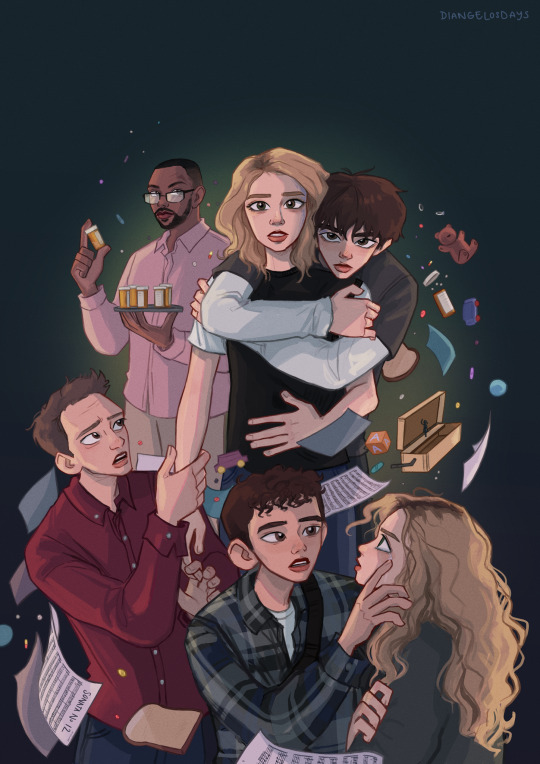
next to normal
#next to normal#n2n#so glad i got the opportunity to see this amazing show performed amazingly by an incredible cast!!#got to meet jack wolfe again afterwards too hes so lovely#i gave him some more of my art he's probably sick of it by now ahdjsj#jack wolfe#caissie levy#eleanor worthington cox#trevor dion nicholas#jamie parker#jack ofrecio#donmar warehouse#musical theatre#musicals#fanart#jack wolfe fanart#illustration#art#posted this on my daehwisdays instagram too if you saw it there first dont fear ive not stolen it i am daehwisdays too lol
132 notes
·
View notes
Text
#ray rants and junk#personal#delete later#polls#phantom of the opera#a lot of Feelings today.#I literally found out about this from a supernatural meme again ffs#hellsite (affectionate)#but yeah. weirdly emotional about it ngl..#the little theatre kid in me is crying.#ILL NEVER SEE IT ON BROADWAY NOW I tell myself as an Australian who previously had no desire to travel to New York to see it previously
317 notes
·
View notes
Text
When people continually whitewash my favourite characters.

[ID: A black and white, rough digital drawing of someone sitting at a desk and clutching their head in their hands. End ID.]
^thank you @describe-things
#This is mainly about Noé Archiviste. But also I will not forget what some people did to Simon Petrikov either when I was watching f&c#I’m so desperate for drawings of them. But for the love of God,is it that difficult? Somehow every other hexadecimal of their#Character design is exactly on model other than their skin. Just. .#OH YEAH I FORGOT KAEYA. FFS. Somehow it’s always the K**luc-ers that always do it. Which makes sense because they disregard his entire char#And with the new influx of atla fans people have been whitewashing Katara too! And I mean drawings of the original show too#probably delete later#And no one seems to have any problems with it? Especially if it’s sexualised art *talking more about Kaeya & Noé here.#People who whitewash the few (and when I say few I literally mean 5/82 playable characters) darker genshin characters. Actually fuck off#If I see ‘it’s just my art style’ or ‘it’s just the lighting’ *every other colour than the skin hasn’t been lightened in the slightest*#One more time-i’m going to explode#Oh and while I’m on this topic! Fuck Bochum for whitewashing literally the entire starlight express cast! Electra being the first ever#non binary character in musical theatre while also being played by black actors. And then Bochum happened.#When was the last time Pearl or Rusty had actors who weren’t white? Literally the last character who hasn’t been replaced is Momma/Poppa.#And being black is so integral to their character and music. You quite physically couldn’t#I really really hope the casting for the London performance this year is like the 1984 cast again. Please.
45 notes
·
View notes
Text
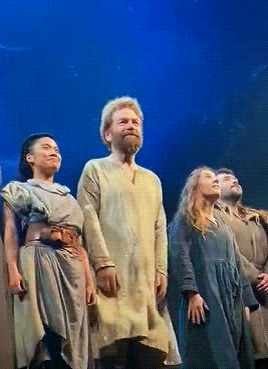
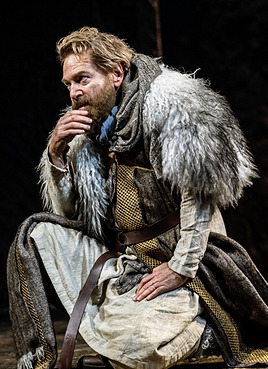

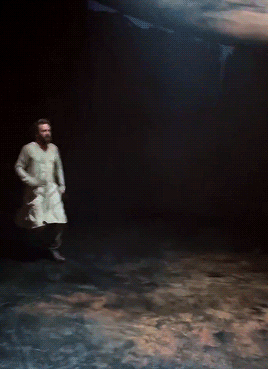
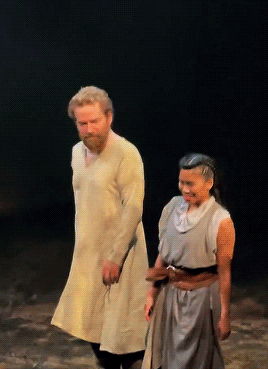
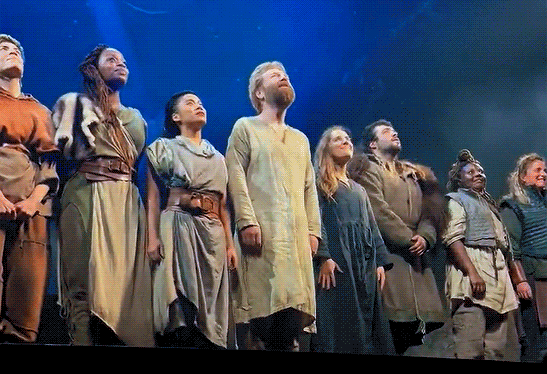
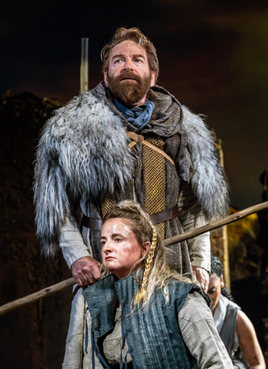
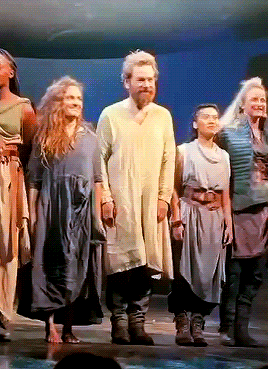
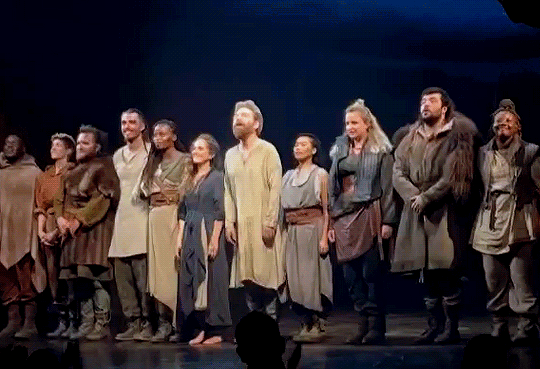
King Lear curtain call
William Shakespeare's King Lear (directed and played by Sir Kenneth Branagh) at Wyndham's Theatre in London's West End, October 22 - November 2 2023.
Playing from October 21 - December 9 2023, 50 performances only. Ken (King Lear) is joined by Mara Allen as Curan, Deborah Alli as Goneril, Raymond Anum as Burgundy, Melanie‑Joyce Bermudez as Regan (RADA graduate 2023, professional debut), Doug Colling as Edgar, Dylan Corbett‑Bader as France, Eleanor de Rohan as Kent, Chloe Fenwick‑Brown as Oswald (RADA graduate 2023, professional debut), Joseph Kloska as Gloucester, Corey Mylchreest as Edmund, Hughie O'Donnell as Cornwall, Caleb Obediah as Cornwall, Jessica Revell as Cordelia / The Fool (RADA graduate 2023).
Source: Jenny_McShane, theothersophiet (via coreymbrasil), zerrintekindor, core_mylchreest
#king lear#king lear (2023)#kenneth branagh#william shakespeare#theatreedit#*theatre#corey mylchreest#doug colling#melanie‑joyce bermudez#deborah alli#caleb obediah#eleanor de rohan#joseph kloska#dylan corbett‑bader#kinglearedit#*edit#i wish i could see it! <3#it looks amazing and captivating#reportedly it's fast-paced at 2hrs#and ken shines yet again <3<3#always giving RADA graduates a start <3
66 notes
·
View notes
Text
thinking about kieran again... particularly about how i feel like he struggles with a weak sense of self and how him identifying so heavily with ogrepon, (or at least the version of ogrepon he originally knew,) probably helped him stabilize how he saw himself, only to have something he considered so core to his identity essentially ripped away from him. not only that, it was by someone he seemingly wanted to trust and open up to, (which i doubt he does very often.)
i definitely think that the way he's handling things is far from healthy, but i can get why he'd have such an intense reaction to losing something that was so important to him and basically being betrayed by someone he wanted to consider a friend.
#i'm saying this as someone who has also struggled my sense of self and used to use characters to help feel more of a person#basically what i'm is that kieran is autistic-coded as hell and i see bits of myself in him#they aren't the prettiest parts but being a teenager with undiagnosed mental illnesses was never meant to be beautiful#also kieran's autonomy constantly being undermined by the ppl around him is a big fuckin mood#oh and the toxic chain possession theories are making me go 🤔#i can't wait to see how things turn out for him...#at the end of the day i just hope things end well and that florian & kieran can be friends again...#ideally they'd still have a friendly rivalry that helps both of them improve for the better (like may & wally)#pokemon#pkmn scarvio#rival kieran#chara : kieran hinoki#<- kiddo's got an mjverse surname now 😏#(it's from the japanese cypress who's wood is used to create masks for noh theatre performances)#mj.txt#scarvio spoilers#sv dlc spoilers
61 notes
·
View notes
Text




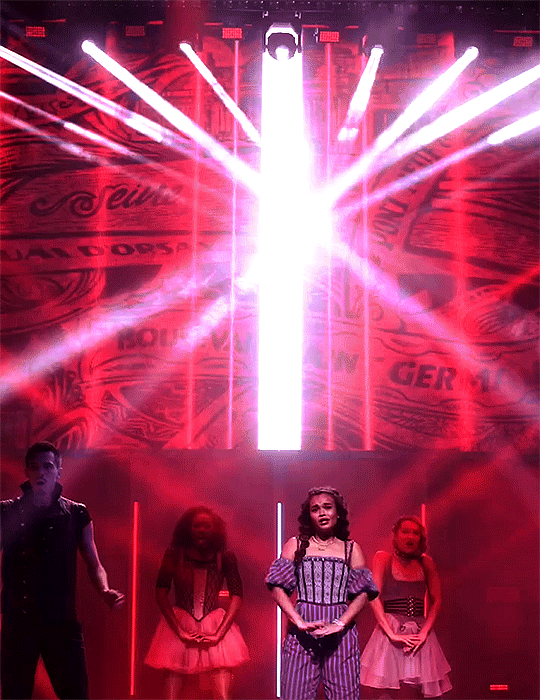
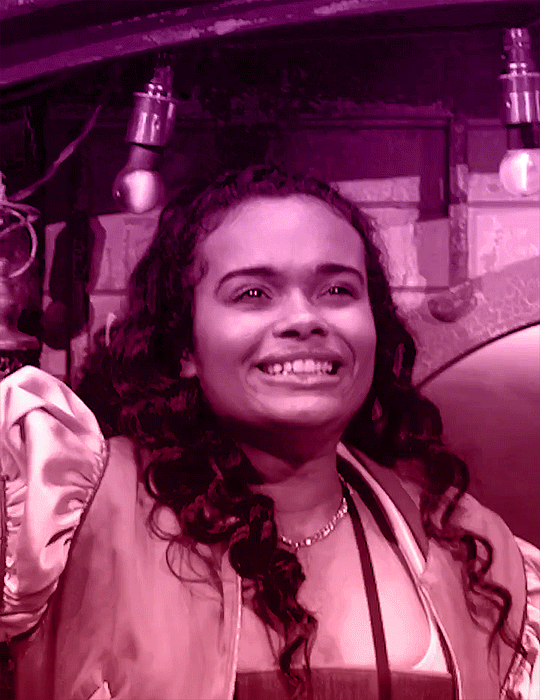


LORNA COURTNEY as JULIET CAPULET in & JULIET
#lorna courtney#& juliet#and juliet#and juliet broadway#& juliet broadway#& juliet musical#and juliet musical#theatreedit#broadwayedit#musicaltheatreedit#broadway#musical theatre#juliet capulet#flashing gif tw#i loved rachel as juliet but i am so bummed i didn't get to see courtney#i'm planning on seeing the show again at the end of august/early september#so hopefully lorna is on bc i love her#creations: gifs#mt: & juliet#p: lorna courtney#ch: juliet capulet
132 notes
·
View notes
Text
Happy Closing Night to Peter Pan Goes Wrong on the West End!
from pangoeswrong instagram
#THE END OF AN ERA#potentially the last time we’ll see the og cast as their cornley characters#i’m not crying you’re crying#also whoever shouts LETS GO right before the song starts#I think it’s leask?#anyway I’m obsessed#also the huh huh which I think is from matt#and charlie’s closing night speech 🥺#getting emotional again ahhh#peter pan goes wrong#happy closing night to ppgw west end!#mischief theatre#mischief comedy#ppgw west end#ppgw video#world of make believe reprise#ppgw curtain call#ppgw bows#ppgw west end cast#pangoeswrong instagram
49 notes
·
View notes